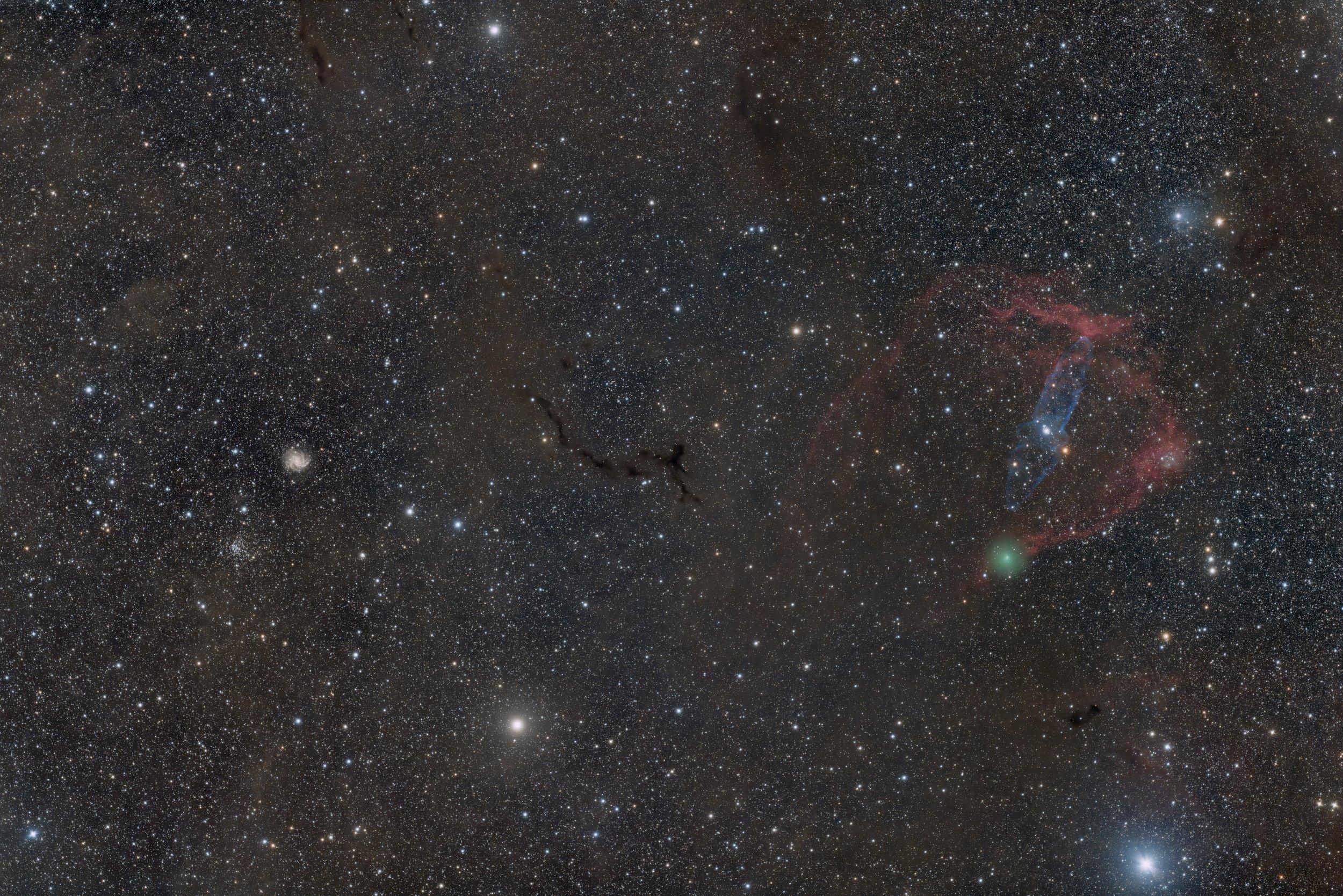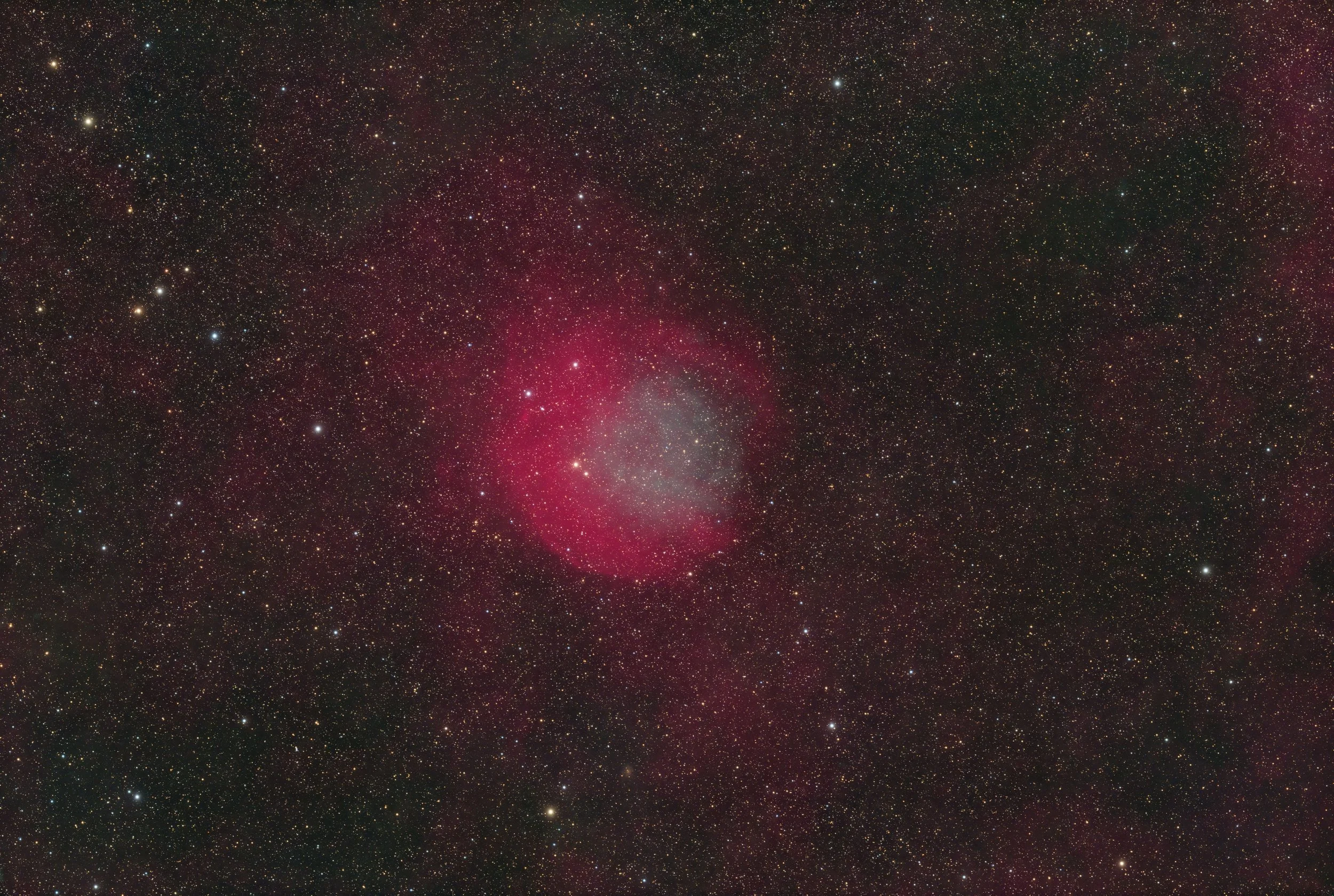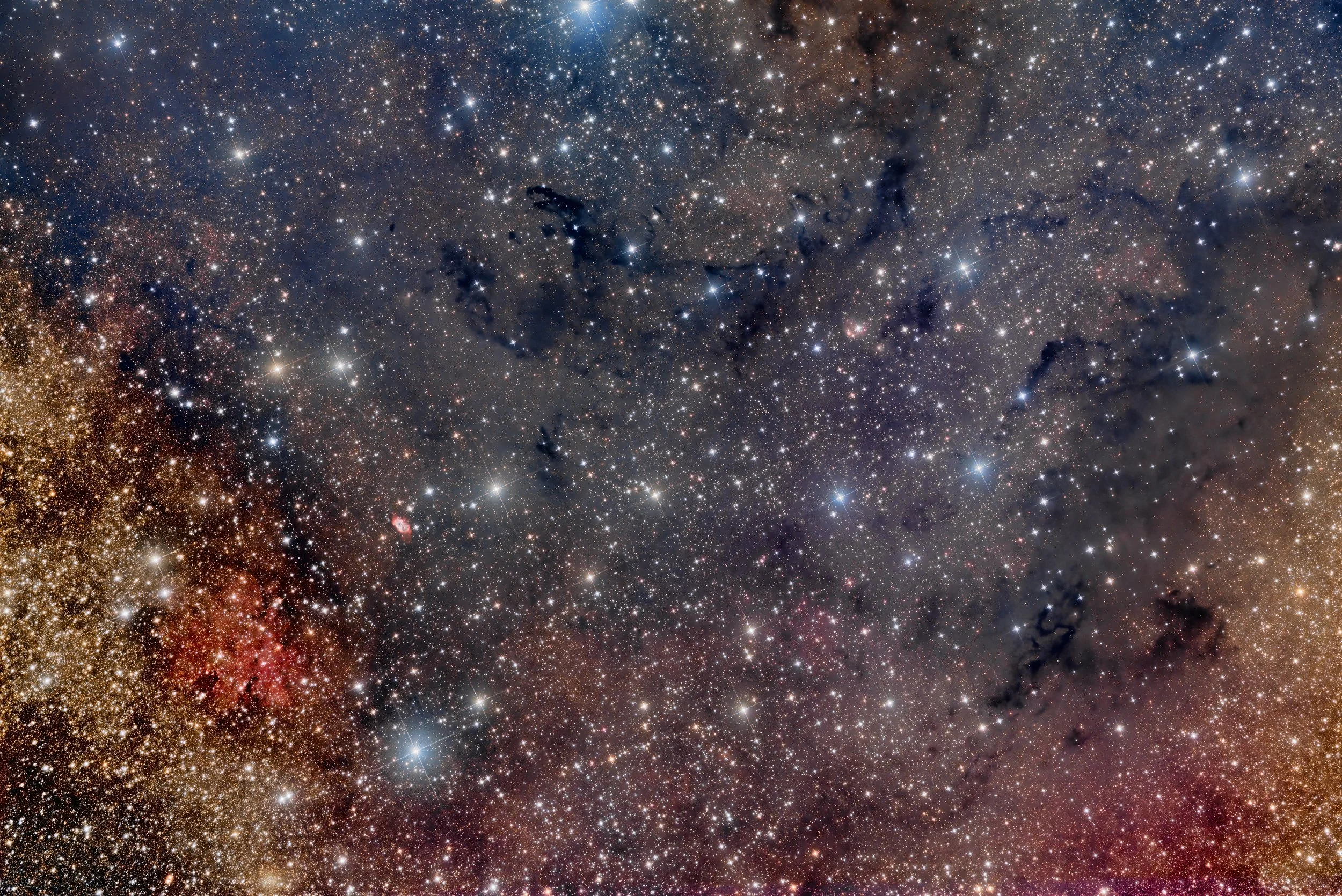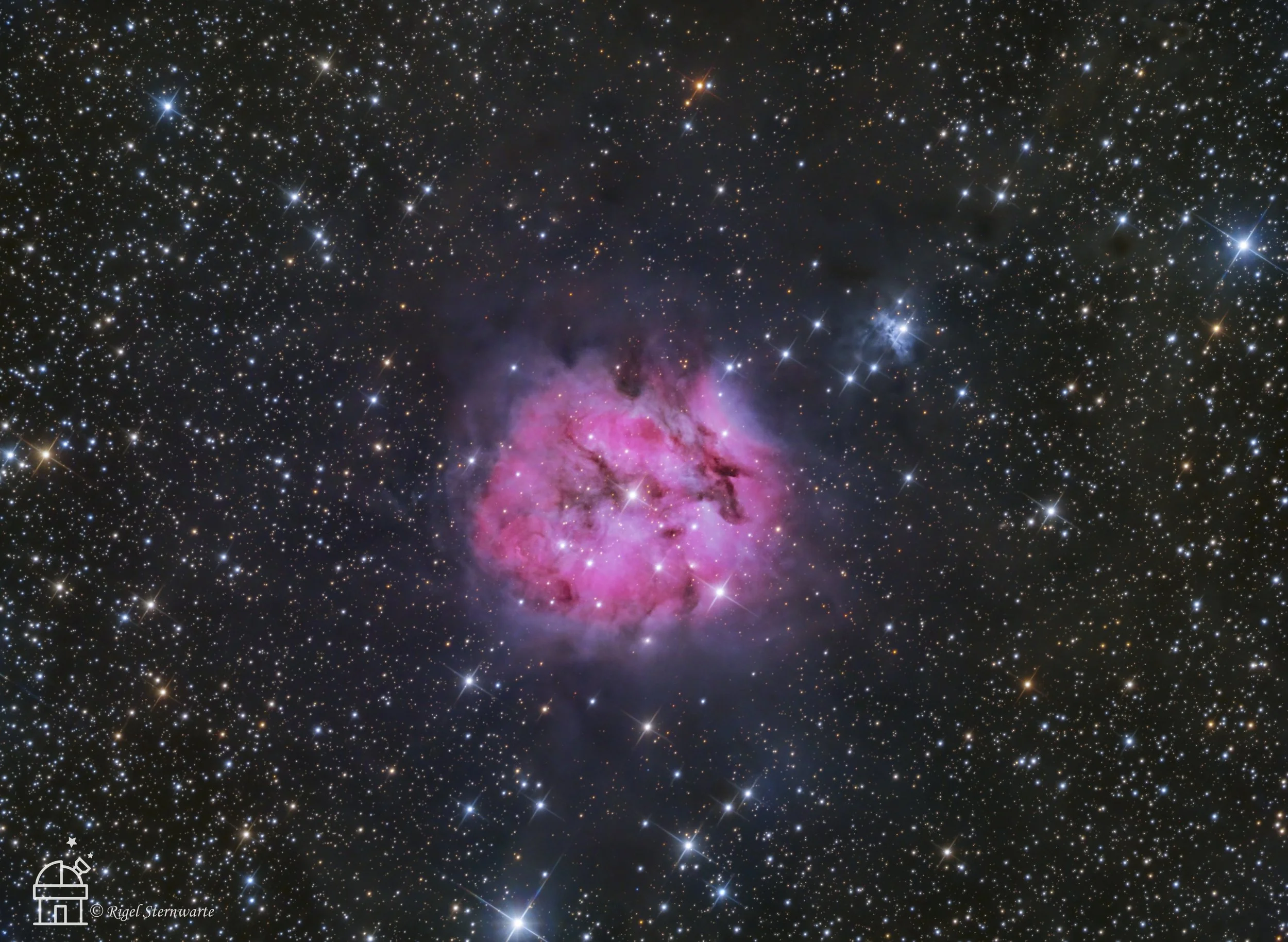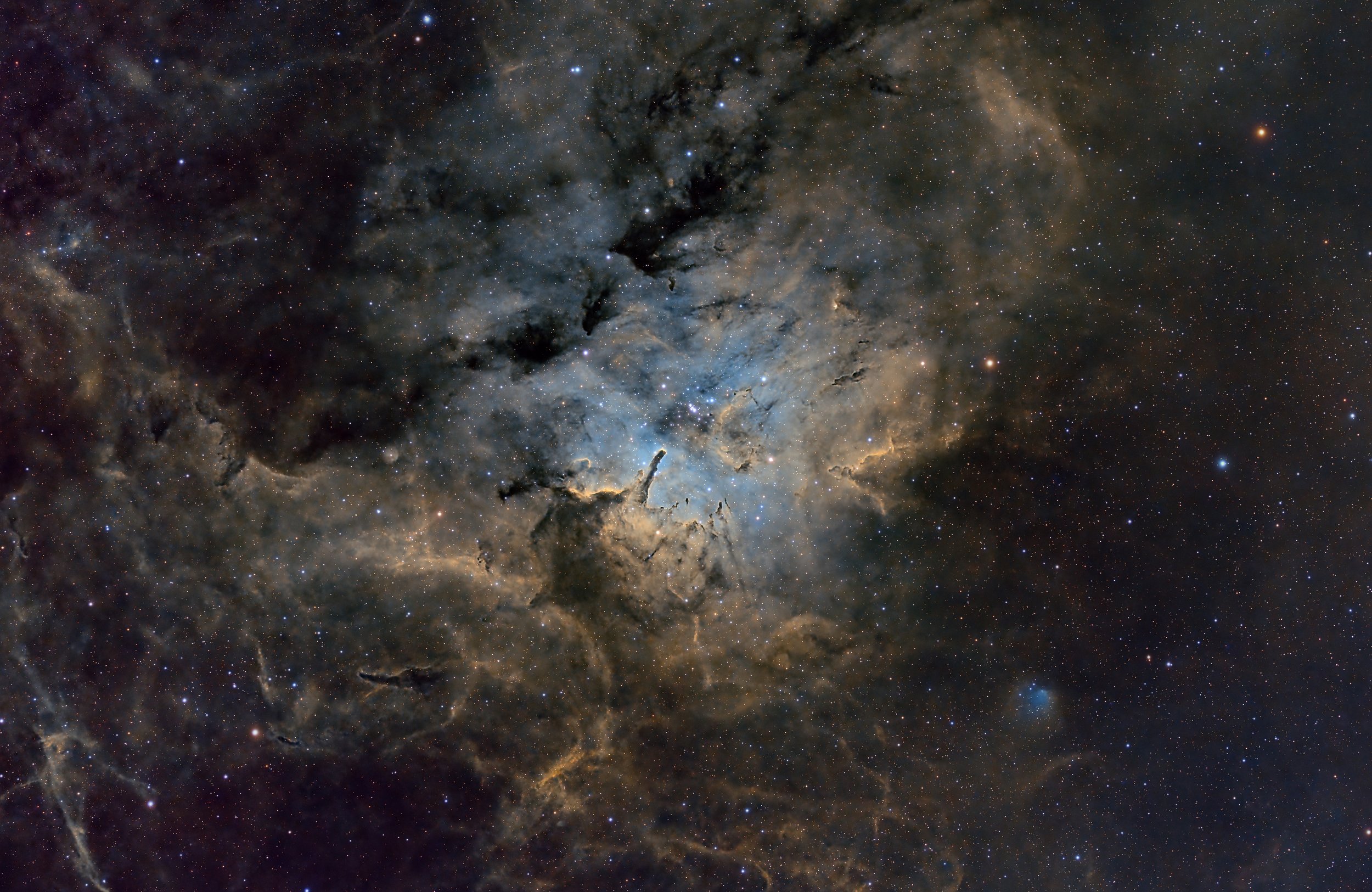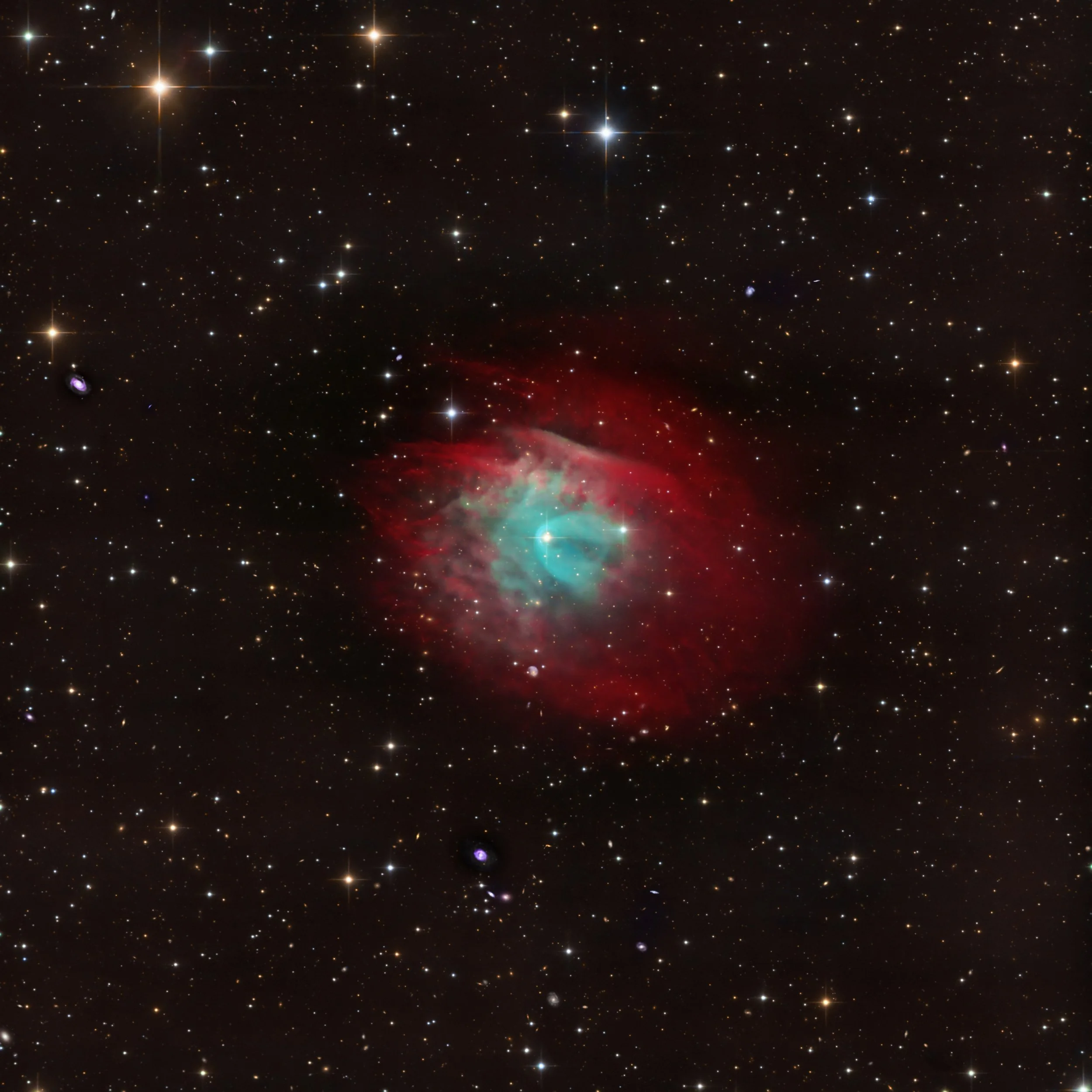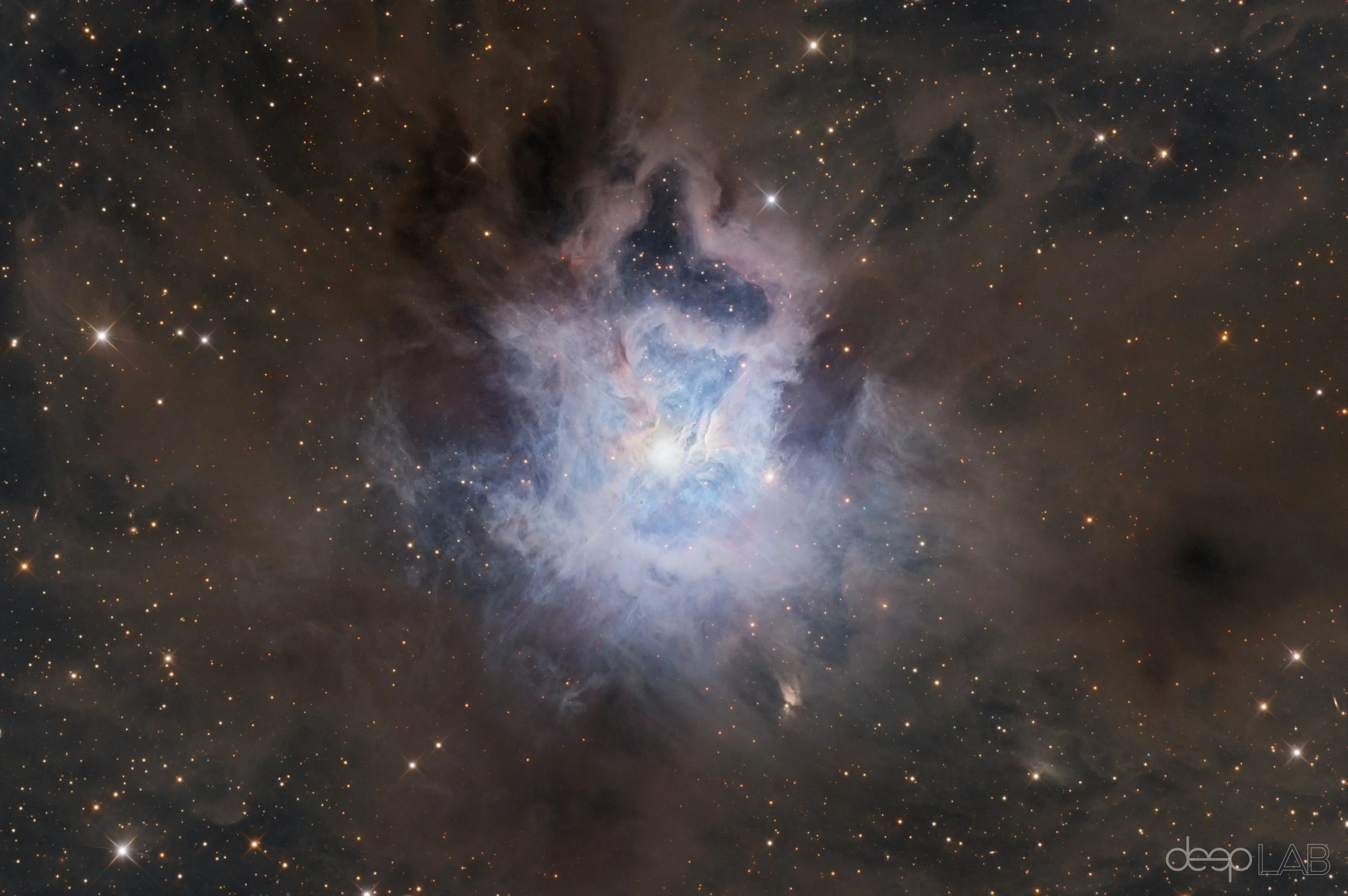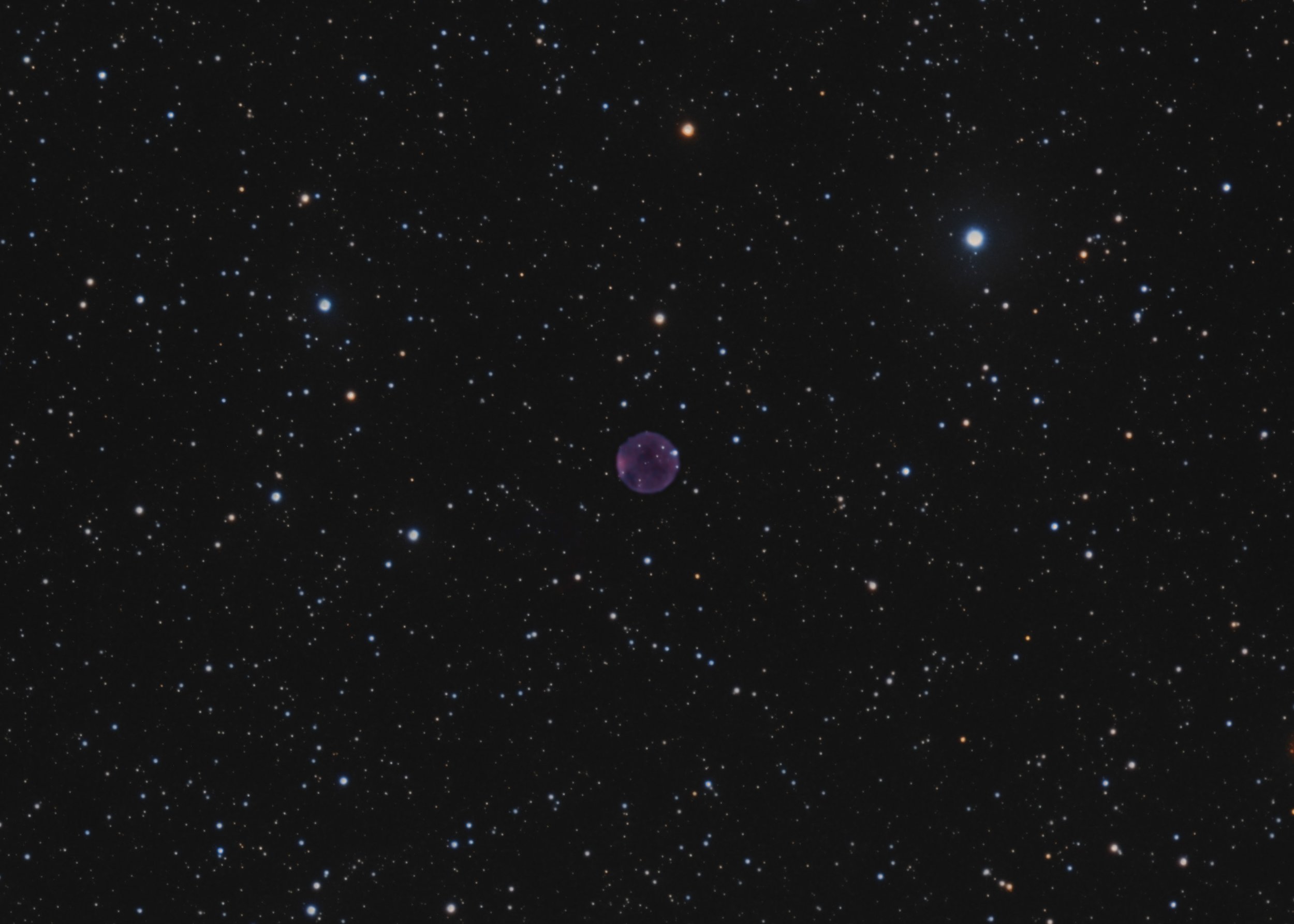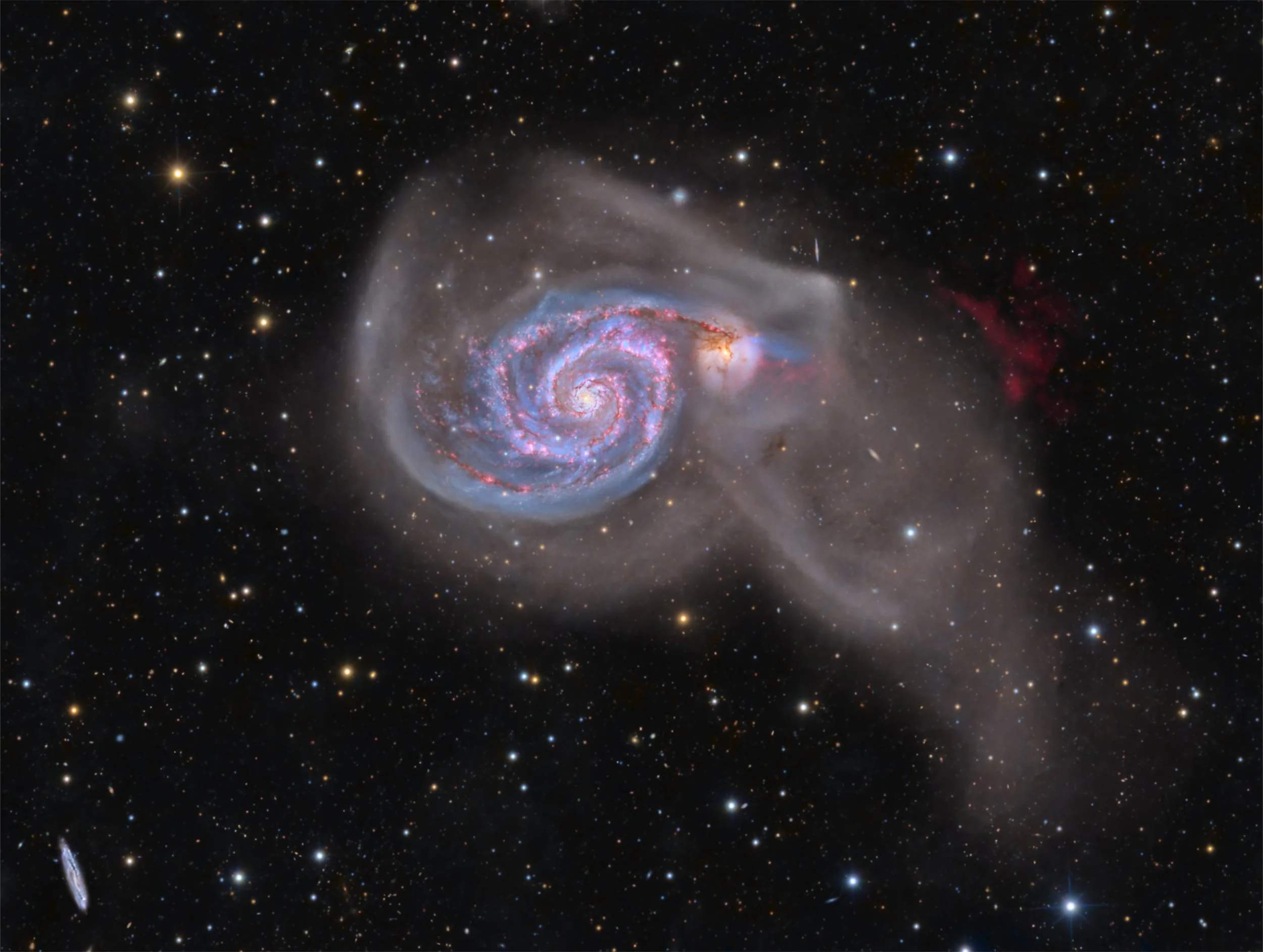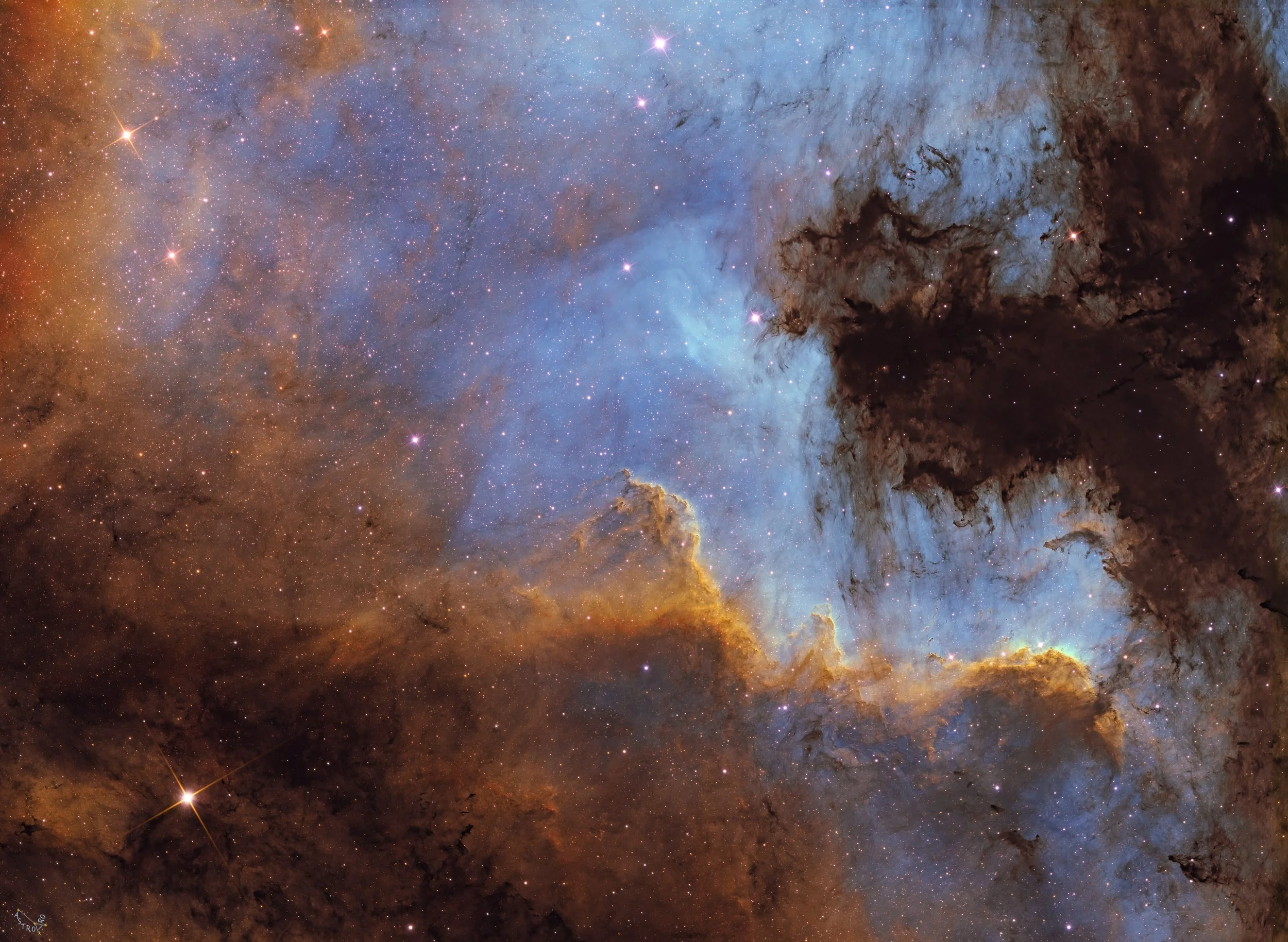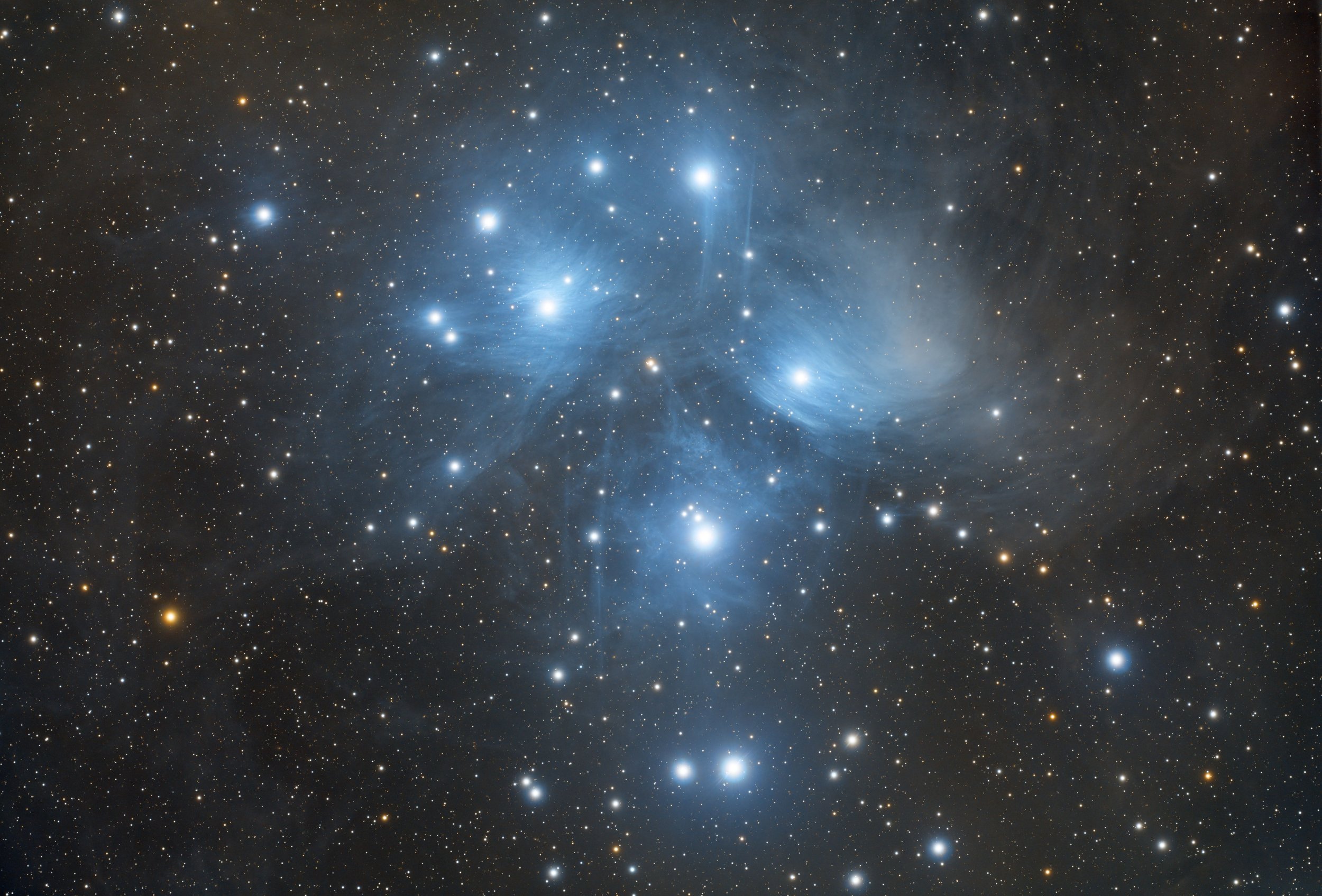
AAPOD2 Image Archives
COCOON NEBULA (IC5146) AND RIVER DUST
Nestled within the constellation Cygnus, the Cocoon Nebula, also known as IC 5146, unveils a realm of star formation and transformation. This cosmic cocoon is a blend of dark interstellar dust and the incandescent glow of young stars, enshrouded in a veil of gas and dust that masks their brilliance. The nebula's captivating form evokes the image of a nascent butterfly taking shape, as hidden stellar embryos prepare to burst forth and illuminate their surroundings. The Cocoon Nebula, showcases the cosmic metamorphosis that underpins the creation of new stars, reminding us of the ever-changing and dynamic nature of the universe.
IC 1311 and Patchick6
IC 1311 and Patchick 6 together grace the night sky with their ethereal presence. IC 1311, a diffuse nebula, shimmers like a cosmic canvas painted with the hues of hydrogen gas, a stellar nursery where new suns come to life. In contrast, Patchick 6, a distant open cluster, dazzles like a jewelry box filled with stars, each one telling a story of its place in the vast expanse. As we observe these celestial companions, we glimpse into the intricate tapestry of the universe, where celestial entities intertwine and create a spectacle that stirs wonder in the hearts of observers.
A bat, a seahorse and a squid meeting a comet (C/2023 E1 Atlas)
Originating from the outer fringes of the solar system, Comet C/2023 E1 (Atlas) embarks on a cosmic journey along a profoundly elliptical path. As it makes its way around our Sun, a luminous coma and occasionally a trailing tail materialize, crafting an enchanting visual spectacle that captivates terrestrial observers. The comet's capricious orbital behavior defies easy prognostication of its luminosity and characteristics, introducing an element of unpredicted allure to its study. In this particular capture, the comet finds itself in the company of a celestial seahorse, SH2-129, and the Bat Nebula, forming an uncommon and intriguing field of view that undoubtedly sparks fascination.
Quest for Cosmos
Hyperbolic star trails, a creative and artistic photography technique, involve capturing star trails that take on a hyperbolic shape due to the movement of the camera or lens during exposure. By introducing controlled camera motion, photographers can produce visually striking and unconventional star trail patterns that deviate from the traditional circular or arc-like trails. This technique adds a dynamic and abstract element to astrophotography, allowing for a blend of science and artistic expression in capturing the motion of celestial bodies.
NGC 6888 Crescent
NGC 6888, known as the "Crescent Nebula," is an emission nebula located in the constellation Cygnus. It's formed by the powerful stellar wind from a Wolf-Rayet star colliding with the surrounding interstellar material, creating its distinctive crescent shape. A fascinating aspect of this nebula is the presence of intricate, filamentary structures illuminated by the energetic radiation emitted by the central star, resulting in a captivating interplay of light and gas.
Ngc 4565
NGC 4565, often referred to as the "Needle Galaxy," is a remarkable edge-on spiral galaxy situated in the constellation Coma Berenices. One of its lesser-known facts is that it hosts a dense central bulge, which contains a supermassive black hole that emits powerful X-rays as it interacts with surrounding matter. This galaxy is also famous for its prominent dust lane that spans its length, expertly made visible in this image, partially obscuring the galactic disk and adding to its distinctive appearance.
Abell 61 Planetary Nebula
Abell 61 is a planetary nebula situated in the constellation Cygnus. As a remnant of a dying star's outer layers, it showcases a spherical shell of ionized gas, illuminated by the central white dwarf star. The intricate structures within the nebula are a testament to the star's final stages of evolution. Abell 61's presence in the night sky allows astronomers to delve into the complex processes that occur during a star's demise, providing insights into the universe's continuous cycle of creation and transformation.
SH2-71 & SH2-72, dark nebula and IFNs Wide field
SH2-71 and SH2-72 are distinct emission nebulae found in the Milky Way's Sagittarius arm. SH2-71, also known as Gum 48, resides in Scutum and houses a cluster of young, hot stars that energize the surrounding gas, resulting in intricate structures shaped by their interplay. SH2-72, the Omega Nebula or Messier 17, in Sagittarius, showcases its iconic "omega" shape and serves as a fertile ground for star formation, revealing insights into the processes governing the birth of stars and their interaction with their cosmic surroundings.
M27 in HOO 100% view
M27, also known as the Dumbbell Nebula, is a planetary nebula situated in the constellation Vulpecula. This stunning celestial object is the result of a dying star's outer layers being expelled into space, forming a distinctive dumbbell shape. The central white dwarf star illuminates the surrounding gas, creating a breathtaking display of intricate structures and vivid colors. As one of the brightest planetary nebulae visible from Earth, M27 provides astronomers with a valuable opportunity to study the final stages of stellar evolution, shedding light on the destiny of stars like our Sun and the complex processes that shape the cosmos.
Cocoon Nebula
The Cocoon Nebula, designated as IC 5146, is a star-forming region residing in the constellation Cygnus. It's characterized by a dark cloud of interstellar dust and gas, which obscures background stars, and illuminated regions where new stars are emerging. The nebula's ethereal appearance resembles a cocoon, giving rise to its name. The young, hot stars within the nebula emit radiation that energizes the surrounding gas, causing it to glow. This interplay of dark and illuminated regions, combined with ongoing star formation, makes the Cocoon Nebula a fascinating laboratory for studying the birth and evolution of stars and the intricate interstellar environment in which they form.
Sh2-86 and NGC6823
NGC 6823 is an open star cluster located in the constellation Vulpecula, surrounded by the intricate Sh2-86 emission nebula. This stellar nursery is populated with young, hot stars born from the same massive molecular cloud. These stars illuminate their surroundings, carving out captivating nebulous structures and actively shaping the region's dynamic landscape. NGC 6823 and its accompanying Sh2-86 nebula provide astronomers with a unique window into the complexities of star formation, evolution, and their intricate relationship with the cosmic environment, enhancing our understanding of the continuous cycle of creation and transformation in the universe.
Abell 35
Abell 35 is a planetary nebula situated in the constellation of Hydra. This intricate shell of ionized gas is the result of a dying star's outer layers being expelled into space, illuminated by the central white dwarf star. Its distinct structure and intricate patterns offer insights into the late stages of stellar evolution. Abell 35's existence aids astronomers in unraveling the complex processes that occur when stars near the end of their lifecycles, enriching the cosmos with elements and showcasing the dynamic nature of the universe.
WR 134
WR 134 resides in the Cygnus constellation as a nitrogen-rich Wolf-Rayet star, belonging to a binary system. These massive stars are characterized by strong stellar winds that strip away their hydrogen envelopes, exposing their dense cores. WR 134's potent winds influence its binary companion and contribute to the galaxy's heavy element enrichment. As short-lived cosmic entities, Wolf-Rayet stars like WR 134 play a pivotal role in the stellar lifecycle, shaping interstellar environments and aiding in the creation of subsequent star generations.
Iris Nebula
The Iris Nebula, also known as NGC 7023, is a stunning emission nebula located in the constellation Cepheus. Its intricate and colorful appearance is caused by the interplay of light reflecting off dust particles and ionized gases within the nebula. Interestingly, the Iris Nebula is illuminated by a variable star named V380 Cephei, which contributes to the dynamic nature of its luminosity.
First image of planetary nebula Si 1-2
Observations of Si 1-2 and other planetary nebulae contribute to our understanding of stellar evolution, as well as the recycling of material within galaxies. The intricate shapes and structures of these nebulae showcase the dynamic interplay between stars and the cosmos, reminding us of the ongoing cycles of creation and destruction that shape the universe.
The Barnard's Galaxy and IFN
Barnard's Galaxy (NGC 6822) takes center stage in this image. Amidst a backdrop of scattered star clusters and other celestial marvels, this capture unveils an elusive wonder known as the Integrated Flux Nebula (IFN). This delicate luminosity originates from the interstellar medium within our own Milky Way galaxy. Capturing the IFN's faint presence stands as a substantial challenge, demanding precise processing techniques, and optimal conditions of a dark night sky. This image provides an opportunity to peer into the intricate interplay between stars, gas, and dust that fills the expanse of interstellar space.
Unveiling hidden features in M51 using 255hours
In a mesmerizing display of cosmic interaction, the Whirlpool Galaxy, also known as M51, unveiled its spiraling arms and intricate features in a stunning astronomical photo that resulted from a 255-Hour Collaboration! This captivating galaxy, located in the constellation Canes Venatici, stood as a prime example of a grand design spiral, with its graceful arms adorned by bright knots of star formation. The exquisite interaction between M51 and its smaller companion galaxy, NGC 5195, was showcased in this image, demonstrating the profound influence of gravitational forces in shaping the evolution of galaxies. The intricate details of M51's structure offered a window into the marvels of galactic dynamics, inviting us to contemplate the vast and ever-evolving tapestry of the universe.
The Cygnus Wall
In a remarkable celestial portrait, the Cygnus Wall unveiled its stunning grandeur within the North America Nebula (NGC 7000). This colossal structure, resembling a jagged and intricate wall of gas and dust, bore witness to the relentless forces of star formation and stellar winds. Energetic young stars nestled within this cosmic tapestry emitted intense radiation, sculpting the wall's mesmerizing contours and cavities. The Cygnus Wall served as an astronomical canvas, illustrating the awe-inspiring interplay between the luminous processes of star-birth and the cosmic architecture that emerges from these dynamic stellar interactions.
